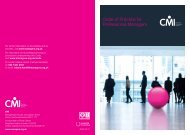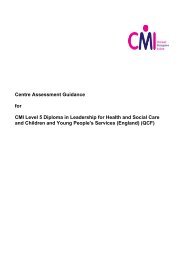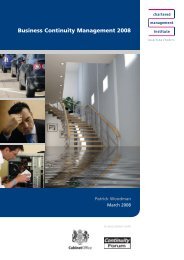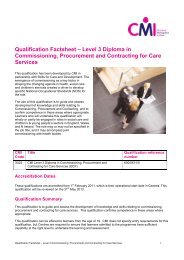Valuing Volunteering - World Volunteer Web
Valuing Volunteering - World Volunteer Web
Valuing Volunteering - World Volunteer Web
Create successful ePaper yourself
Turn your PDF publications into a flip-book with our unique Google optimized e-Paper software.
<strong>Valuing</strong> <strong><strong>Volunteer</strong>ing</strong>By Petra Cook and Nicky JacksonA route to professional development:Views from VSO volunteers and managersJanuary 2006Supported by
ForewordGovernments, community-based organisations and small enterprises inthe developing world are recognising the need to improve their internalstructures and processes in order to meet the task of tackling poverty anddisadvantage in their communities. This is reflected in an increasing numberof requests received by VSO from overseas partners seeking volunteers withmanagement or business backgrounds. Yet previous VSO research suggeststhat some individuals in the UK may be reluctant to commit to volunteerplacements because of concerns about the impact absence might haveon their career.For the past five years we have been working in partnership with VSO,enabling our people to take advantage of challenging overseas volunteerplacements. As a global management consulting, technology services andoutsourcing company, innovation is important to us. At the core of deliveringinnovation to our clients is a dynamic, diverse and creative workforce.I therefore welcome the research that has been carried out by the CharteredManagement Institute, in partnership with VSO, to evaluate the professionaldevelopment benefits of volunteering. The findings demonstrate thatvolunteering can be a route to gaining and enhancing important businessand management skills. Employers in the UK should do more to embracethe skills and experience that managers with volunteering experience couldcontribute to their organisations. Individuals should also take advantage ofthe development opportunities that volunteering could present to them;career paths are becoming more diverse and there are more ways to getahead than staying in the office.Vernon Ellis, International Chairman, AccentureAcknowledgementsThe Chartered Management Institute acknowledges the financial supportand advice provided by VSO for this project. The authors would particularlylike to thank Sonja Mitchell, Laura Solomon and Reshna Shah from VSO fortheir invaluable support and guidance throughout the project. The Instituteis very grateful to all Institute members and VSO volunteers who participatedin this research and acknowledges the work of Nick Rubashow at Makrotest,the specialist research consultancy, who undertook the telephone interviewsand detailed qualitative interviews. Thanks also to Ben Langdon for providingthe front cover photograph.1
IntroductionWith markets becoming ever more globalised, the UK is increasinglydependent on its knowledge economy, in which being able to solve issues ofcomplexity is paramount. In many environments, managers need to be ableto work with people who have different timeframes, values and interests.Having a broad viewpoint, being able to communicate well across all levelsand having the ability to take responsibility for delivering results are criticalmanagement skills in today’s workplace.This research primarily explores the extent to which volunteering can help todevelop these critical professional management skills. It assesses the personalexperiences of senior managers and also their views on volunteering intheir capacity as employers. The study also examines the views and actualexperiences of returned VSO volunteers.The findings help to illustrate the business benefits for companies andpersonal development opportunities for individuals that can be gainedthrough voluntary activity. It also helps to highlight routes available, such asChartered Manager status, for returned volunteers to achieve recognition forthe skills they have gained whilst volunteering.Research MethodThe quantitative research was undertaken among a stratified sample of5,000 individual Institute members to represent the employer sample, drawnacross senior managers and across all sectors and sizes of organisation. Thesemanagers were sent an online survey in October 2005 and 516 managersreplied. At the same time, a telephone survey was conducted with 100returned VSO business and management volunteers, who had completed atwo-year placement overseas.From these two quantitative surveys, a total of 20 follow-up qualitativetelephone interviews were carried out. These were split evenly amongst bothVSO returned volunteers and employers of potential or returned volunteers.2
Key FindingsExtent ofvoluntary activity• 78 per cent of managers are actively involved in some form of voluntaryactivity. For 60 per cent of managers this takes place in their localcommunity, whilst 6 per cent have had some experience of voluntarywork in a developing country.• Managers who volunteer are particularly keen to work in areas relating tobusiness advice (37 per cent); education (36 per cent); environment(19 per cent); and tackling poverty in developing countries (16 per cent).Motivations• 79 per cent of managers cited the desire “to give something back” and“to improve things, help people” as the key reasons for volunteering.• Although such altruistic reasons came first, there was significantappreciation that those volunteering could benefit themselves, in terms ofmeeting new people and building networks (23 per cent), learning newskills (16 per cent) and as a route to professional development (12 per cent).• Among the returned VSO volunteers, the key reason for volunteering was“to experience living and working in a different culture”, alongside thedesire to give something back and specifically to help make a difference ina developing country.• Only one in ten of the returned VSO volunteers identified the desire todevelop their professional skills or broaden their management skills at theoutset of their placement. However, on reflection, the majority then highlyrated the skills they developed during their two-year placements overseason return to the UK.Management skillsdeveloped throughvolunteering• 94 per cent of employers agree or strongly agree that long-term overseasvoluntary activities broaden skills and experiences, and 48 per cent claimthat it increases employability.• Nearly 60 per cent of employers agree that local voluntary projects can be aneffective method in developing management skills, and 39 per cent considerlong-term overseas voluntary projects as a specific development tool.• People skills are considered to be highly developed through volunteeringand over a third of employers reported skills gaps in this area.• Those volunteers who had returned from two-year placements overseasfelt that it was an extremely effective route to developing many of theparticular management skills that employers are experiencing difficultyin recruiting such as: working with different cultures; communication;problem-solving; managing change; influencing and persuading; conflictmanagement; and coaching and mentoring.3
Enhancedemployability oflong-term overseasvolunteers• 80 per cent of returned volunteers felt their confidence in their ownabilities had increased through doing a VSO placement. The sameproportion of returned volunteers also believed that they had gained skillsthey would not have acquired if they had stayed in the UK.• On return to the UK, the majority of returned volunteers were inemployment within 3 months, and 83 per cent had found appropriate workwithin 6 months. Generally, there was not much movement between jobs asnearly half of returned volunteers had not changed jobs more than once.• Although 88 per cent of employers claimed that they would not be adverseto employing a manager who has recently returned from volunteeringoverseas, those questioned in more detail still mentioned possibledrawbacks such as the difficulty of adapting to being back to the UK;being out of touch; and losing certain technical skills, which was referredto as “skills fade”.• Employers in the public sector were more inclined to see the benefits ofvolunteering compared with the private sector. However, there are stillperceptions across both sectors that long-term overseas placements werefor those wanting to take a ‘gap year’ or simply travel.Recognising thevalue of voluntaryactivity• It is important that volunteers make the most of their voluntary experienceswhen presenting them to a potential employer. Key skills that returnedVSO volunteers felt should be presented included:• Responsibility – being in a position of authority with accountabilityfor results• Communication - with all levels of management and differenttypes of people• Creativity – having to be resourceful and find ways aroundproblems• Commitment – to projects and their work in general.• 41 per cent of managers agreed that they would be more inclined toemploy a VSO volunteer who has some form of formal recognition ofmanaging significant change, such as Chartered Manager status, and 36per cent felt that some form of management qualification would be useful.The VSO volunteers in particular saw value in keeping a workbook to helprecord their achievements during their voluntary activity.• 41 per cent of employers also felt that it would be valuable to have moreinformation available about the professional development benefits ofoverseas volunteering.4
1. Managerial volunteering: thelandscape1.1 Extent ofvolunteering70At a time when many businesses openly recognise the importance ofincorporating social responsibility into business values, it is perhaps notsurprising to find that 78 per cent of managers surveyed reported thatthey have been involved in some form of voluntary activity.However, only 10 per cent of managers were involved in voluntarywork through a scheme organised by their employer. It appears that themajority of managers take up volunteering to meet personal objectivesand through their engagement with issues or interests in their localcommunity. Six per cent of managers, a small but significant number,had been involved in activities in developing countries.Chart 1: Voluntary activities carried out by managers (base 516)6050% of managers403020100In the local community Other activities in the UK Not involved in any Scheme with employer In a developing country1.2 <strong><strong>Volunteer</strong>ing</strong>demographics- by organisationalsize and ageLooking at the results broken down by organisational size (see Table 1),managers in the smallest organisations (0-25 employees) had carried outthe most volunteering in the last five years, with 73 per cent volunteeringwithin their local community. From the more detailed interviews withmanagers, those from smaller specialist companies noted how they usedtheir voluntary activities to help build and maintain networks that couldoffer potential benefits to their business.Not surprisingly, more managers in larger organisations have done somevoluntary work through a scheme with their employer (12 per cent), astypically larger organisations will often have more flexibility in terms oftime and investment to help support employees who participate inthese schemes.Looking at those managers who had volunteered overseas, they comefrom either end of the spectrum in terms of the size of their organisation- either micro businesses or large organisations. This was also reflectedin the sample of returned volunteers, who either came from companieswith less than 25 employees or companies with over 1,000 employees5
Table 1: Type of voluntaryactivities managers havebeen involved in brokendown by organisation sizeBase: 516 managersVoluntary work with your localcommunityVoluntary work through ascheme with your employerOther voluntary activities inthe UKVoluntary work in a developingcountryHave not been involved involuntary work0-25 employees(%)26-250 employees(%)Over 250employees (%)73 60 527 9 1243 35 279 3 617 24 26(see profile of respondents - page 20). Looking at the age profile of thosewho volunteer (see Chart 2), there is a noticeable trend for voluntary activityto increase with age. The only exception is that younger managers are morelikely to take part in schemes offered by their employers (23 per cent).100Chart 2: Types of voluntary activities managers have been involved in(broken down by age)90Percentage (%)807060504030Not involved in anyIn a developing countryOther activities in the UKScheme with employerIn the local community20100Total Under 39 40-49 50-59 Over 601.3 Key areasof interest forvolunteeringAs already identified, the area which interests the majority of managers istheir local community. Looking at specific issues, managers who volunteerare particularly keen to work in areas relating to business advice (37 percent); education (36 per cent); the environment (19 per cent); and tacklingpoverty in developing countries (16 per cent).There are certain areas of volunteering which attract more interest from femalemanagers, most notably education, the environment, health and the arts. Malemanagers, on the other hand, expressed a keener interest in business advice,sports and religion than their female counterparts (see Chart 3).6
50Chart 3: Managers’ areas of interest in volunteering4540TotalMaleFemale35Local community% of managers302520151050Business AdviceEducationEnvironmentalSocial WelfareSportsTackling poverty indeveloping countriesHealthCivil GovernanceReligionPoliticsArtsFrom the detailed interviews with managers, there was a considerable varietyof voluntary activities, and these included:• working as a trustee / governor for a local organisation or school, or in onecase a large national organisation• working as a sports coach or trainer• working as a fundraiser• running specific projects for a voluntary organisation• carrying out specific projects overseas.1.4 Motivations tovolunteerManagers felt that the top motivation for people to volunteer within their owncommunity was ‘to give something back’ (79 per cent). The main reason citedfor volunteering overseas, was ‘to improve things, help people’ (65 per cent).Although altruistic reasons came first, there was a significant appreciationthat volunteering could also help career development in terms of meetingnew people (23 per cent); learning new skills (16 per cent); and as a route toprofessional development (12 per cent).<strong>Volunteer</strong>s who had returned from placements overseas cited a variety ofreasons for wanting to go, including ‘to experience living and working in adifferent culture’ (37 per cent), as well as ‘to give something back to society’(28 per cent). Many also felt it was time for a new challenge and adventureor wanted a change from their current role. One in ten mentioned that theyhad been motivated to volunteer in order to develop their professional skillsor broaden their business and management skills.7
9080Chart 4: Managers’ perceptions as to the motivations to volunteerOwn communityOverseas70To give something back% of managers6050403020100To improve things,help peopleIn a response to arequest for helpOwn needs, interestTo meet people,make friendsNeeds of familyor friendsTo learn new skillsAs a route to professionaldevelopmentConnection withpaid workAs a career breakNeed to tackle povertyOpportunity to gain aqualificationTo gain internationalexperiencePersonal perspective – challenging traditional career pathsA returned volunteer, who had worked in a senior role as a marketingdirector for a telecommunications company before going overseaswith VSO, believes that “taking on job after job within a commercialenvironment is not the only way to career development”. When signingupto volunteer overseas, admittedly professional development wasnot his key reason, but in hindsight he considers that it was a uniqueopportunity to broaden his management and international skills: “Interms of the experiences and different cultural views, I have developeda different way of treating people and approaching problems. I think itwas a completely invaluable experience”. He found no problem gettingemployment with another commercial organisation on return to the UKand said that they saw his voluntary placement as a major benefit.In the detailed follow-up interviews with returned VSO volunteers, severalsaid that the initial motivation had been to give something back using theskills they already had, rather than to develop new skills. However, nearly allthe volunteers thought that the experience of working in a different culturewould contribute to both their personal and professional development.Many had identified the following management skills as those they thoughtthey might gain prior to their overseas experience: mentoring and coaching;communication; dealing with people with vastly different experiences;problem solving; and taking on more responsibility than in the UK.8
2. Management skills developedthrough volunteeringEmployer perspective – management skills developed overseasA senior manager working for the Ministry of Defence has employedmany returned volunteers and believes the skills they learn overseasare invaluable. “It pushes individuals outside their normal comfortzone and the experiences they get from that can apply to their dayjob and they may also view the way they do things slightly differentlyin the future”. From his perspective, volunteering can help to developleadership, project and programme management as well as allowingindividuals to enhance their people skills. “When it comes to planning,they are probably more astute and have a better judgement of thevarious factors they are considering – both through having practisedthem and just the wider exposure to different environments”.2.1 Employers’views: volunteeringto develop skillsWe asked managers to rate what they thought were the most effectivemethods of developing management skills. Almost 60 per cent of managerseither agreed or strongly agreed that local voluntary projects are an effectivedevelopment method and 39 per cent valued long-term overseas projectsas a development route. It is possible that long-term volunteering did notrate quite as highly compared with other methods as it is likely that mostmanagers have had less experience and exposure to its benefits.<strong><strong>Volunteer</strong>ing</strong> can also provide various methods of development indirectly,such as project management and cross-functional working. People skillsand communication can also be highly developed through voluntaryactivities, which involve an element of mentoring, especially duringlong-term overseas placements.Table 2: Managers whoagreed or strongly agreedthat the methods wereeffective in developingmanagement skills.Base: 516 managers% of managers agree or strongly agreeProject management 77Cross-functional working 76Informal mentoring 74Formal mentoring 70Secondment to another organisation 65Other management qualifications 64In-company job rotation 63Action-learning teams 63360 degree feedback 60Local voluntary projects 59Intensive high level training programme 59MBA 53Other business school programmes 51Participation in seminars/conferences 50Long-term overseas voluntary projects 39Accelerated learning 209
Those managers interviewed about the benefits of volunteering thatthey had experienced, either personally or through employing returnedvolunteers in terms of management skills, identified the following areas:• General management skills - the ability to deal with a wide varietymanagement styles and levels, team leading, problem solving,communication skills and greater awareness of others• Strategic understanding - through working as a trustee at Board level ornegotiating with senior Government officials overseas• Coaching, teaching and mentoring skills• Building and maintaining networks• Gaining and further developing technical skills - the ability to design adatabase, business plan/project management, dealing with planningapplications• Being a good employer - several of those from larger organisationscommented that it was valuable for volunteers to build up goodwill andcontacts within the local community.Overall, employers had extremely positive opinions as to the benefitsof long-term volunteering. Table 3 shows that 94 per cent believe thatvolunteering broadens skills and experience, 70 per cent agree thatvolunteers are more capable of handling diversity and 48 per cent agreethat it increases employability.Table 3: Managers whoagreed or strongly agreedto statements regardingvolunteering.Base: 516 managers% of managers agree or strongly agreeIt broadens skills & experiences 94<strong>Volunteer</strong>s are more capable of handling diversity 70It increases employability 48<strong>Volunteer</strong>s lose touch with the latest thinking &18market trends<strong>Volunteer</strong>s become out of date with newtechnologyOther management qualifications 14<strong>Volunteer</strong>s are less loyal to employers 11It is like taking a holiday 56510
2.2 Returnedvolunteers’perspectivesPersonal perspective – valuing skills developed overseasAn EMEA sales and development manager, who was in the Gambiawith VSO in 2003, felt that his voluntary placement considerablyhelped him to develop particular skills. “People who have spenttime in that type of environment show a number of qualities, whichyou probably don’t find in a lot of other business people”. He nowvalues the experience within his current role particularly in terms ofcommunicating with people internationally. He no longer assumesthat there is just one right way around solving a problem: “I thinkwhat it has made me learn, probably more than anything else, is tobe open-minded about the way in which people approach things,different issues, and different problems”.Eighty per cent of returned volunteers felt that they had gained skills theyotherwise would not have done in the UK by volunteering overseas. Thetypes of skills they felt were developed overseas were extremely broad,ranging from project management to influencing and persuading. Table 4shows that there is a high positive net level of agreement in terms of thedevelopment of key management skills whilst on an overseas placement.Table 4: Net level ofagreement by returnedvolunteers regardingspecific skills that weredeveloped during theirVSO placementBase: 100 returned volunteersNet level of agreementWorking with different cultures 92Communication 74Problem-solving 57Influencing & persuading 46Managing change 37Coaching & mentoring 37Encouraging innovation 35Negotiation 35Developing personal networks 33Project management 33Leadership 33Conflict management 19Managing diversity 19Ethical practice 18Strategic thinking 17Managing information & knowledge 12Meeting customer needs 5As volunteers are immersed into a completely new environment, it is notsurprising that ‘working with different cultures’ was the skill which nearly allof the returned volunteers agreed they had developed (92 per cent).11
In addition to this, in the detailed follow-up interviews, returned volunteersmentioned specific skills such as training, financial skills and problem-solving.They also specified that they had to operate at many different levels, forexample, communicating with senior government officials. As a result,many felt that communication was a key skill that has been developedthrough volunteering and this was mentioned in many different contextsby the volunteers.Some of the volunteers commented that they became more patient whendealing with people from many different backgrounds and cultures.They had developed “more of the ‘softer’, people-focused skills such ascommunication and coaching and mentoring”.Eighty per cent also agreed that doing a VSO placement had helped to increasetheir confidence in their own abilities. Indeed, in follow-up interviews, severalvolunteers attributed their increased confidence to the fact that they had takenon far more responsibility than in their previous employment.Personal perspective – confidence gained overseas“The diversity, the self-confidence, the openness to change. The goodside of being abroad is you can come back to the UK and say ‘No, Iknow you’ve been doing that for the last 20 years, but believe me,there is another way to do this”. You can look clearly at problems. Ithink passion as well – that ties into the self-confidence.”VSO Returned <strong>Volunteer</strong> – Management Advisor in Nigeria 2003.12
3. Attitudes to employing volunteers3.1 Context -the market formanagement skillsAround a third of employers agreed that their organisation has problemsrecruiting managers. Table 5 shows some of the particular skills gaps inorganisations as mentioned by employers. This has been set alongside thelist of key skills developed by VSO volunteers whilst on their placements. Thisclearly shows some alignment in the skills which managers have problemsrecruiting in and the skills which are developed by volunteers.For the top three skills gaps mentioned by managers, on average 50 percent of returned volunteers agreed that they developed these particular skillsabroad. This indicates that returned volunteers may potentially provide anuntapped resource for organisations recruiting managers to consider.Respondents who agreed or strongly agreed (%)Table 5: Skills gaps inorganisations vs. skillsdeveloped by returnedvolunteersSkills gaps in organisations Skills developed by returnedvolunteersBase: 516 managers Base: 100 returned volunteersManaging change 38 54Coaching & mentoring 35 53Conflict management 34 48Strategic thinking 31 44Leadership 30 53Encouraging innovation 29 51Communication 27 78Managing diversity 26 48Project management 25 58Influencing & persuading 23 633.2 Employerattitudes towardsvolunteeringOverall, the experience of employing returned volunteers was generallyviewed as positive. Sixteen per cent of the sample of managers hademployed someone who had worked overseas in a voluntary capacity, and67 per cent agreed that they brought different skills and experiences to theorganisation in comparison with other employees. The attributes specificallymentioned included confidence, breadth of experience, ability to managediversity, a wider perspective and greater flexibility.Employer perspective - attitude to employing VSO volunteers“I think VSO can add a great deal to an individual’s outlook andperceptiveness. It can give a lot of positive evidence about publicservice, commitment to others and integrity.”Head of Legal & Democratic Services, a Borough Council13
In the detailed interviews, employers had mixed reactions as to the impactof long-term volunteering on managers’ employment prospects. Mostemployers believed that volunteering would improve employability due tobroader skills, experience and confidence, although some thought this woulddepend on the type of job that was being considered. A minority felt that along-term placement could have a detrimental impact, in terms of becomingout of date with the latest thinking and market trends or could makevolunteers less loyal to their employers (see Table 3, page 10).Base: 100 returned volunteers Returned volunteers (%)Generally positive 51Table 6: Reaction fromprospective employers tovoluntary placementsGenerally negative 7Mixed reactions from different employers 18No specific reaction 13However, returned volunteers reported a positive response to their experiencefrom prospective employers. Table 6 shows that 51 per cent of those inemployment found that they had received a positive reaction, only 7 per centhad a negative reaction.Base: 100 returned volunteers Returned volunteers – agree or strongly agree (%)Communication 30Table 7: Perception ofreturned volunteers ofextent to which employersvalue volunteering asdevelopment of skillsProblem-solving 29Encouraging innovation 26Influencing & persuading 24Project management 24Yet despite this, there was still concern from some returned volunteers thattheir skills were not fully appreciated by prospective employers. Looking atthe top five skills which they personally felt were developed, Table 7 showsthe extent to which they felt their employer valued their VSO experience interms of developing particular skills.In addition to this, 42 per cent of returned volunteers agreed that they weremore focused on what they wanted from their careers having been overseas.Contrary to the perception amongst some employers that taking time outto volunteer was likely to decrease their loyalty to employers the oppositeappears to be true.14
Employer perspective – benefits of long-term volunteeringA group HR director for a large quantity surveyor was a strongadvocate of the skills that can be developed through long-termoverseas volunteering. His organisation offers sabbaticals to their staffand has found that returned volunteers come back refreshed andre-energised having taken the time to do something abroad and lookat things from a different perspective. He feels that volunteers gaina sense of maturity and “as volunteers go into a different areas, theylearn to work with a different mind set … we’ve found that they havebeen quite successful in moving on upwards within the organisationwhen they’ve come back”.3.3 Overseasvolunteers’experience ofreturning to workInterestingly, out of the returned volunteers interviewed in the quantitativesurvey, of those seeking employment only 5 per cent found it difficult tofind work on returning to the UK. Despite some employers’ concerns thatreturned volunteers may have trouble settling back into life in the UK,68 per cent of returned volunteers were in employment within the first 3months, 83 per cent had found appropriate work within 6 months; andnearly half have stayed in the same job since.Returned volunteers during the qualitative interviews mentioned thattheir experience on return to the UK also depended on the type ofsector or job for which they were applying. Those returning or enteringthe international charity sector found, perhaps unsurprisingly, that theirexperience was viewed in a very positive light.Within the public sector, attitudes of employers to returned volunteersvaried considerably. Although many were positive, there was still theperception that long-term overseas placements were for those wantingto take a ‘gap year’ or simply travel. There was also less understanding asto the benefits of volunteering from employers in the private sector and itwas harder to persuade these employers as to the value of the experience.15
4. Recognising and marketing thevalue of voluntary activityA key issue for those who are involved in voluntary work is learning howto present their activities in a positive light to prospective employers.Although most returned volunteers claimed to have had a positiveresponse from employers, there are still concerns that the prejudice stillstands that volunteers are taking time-out from their careers, treating itas a break and will be out of touch with current markets.In retrospect, most returned volunteers felt that it was important topresent their voluntary placement as an integral part of their careerdevelopment. It was crucial to highlight their placement in a positivelight, emphasising the skills developed, especially as 80 per cent agreedthat they had gained skills they otherwise would not have done if theyhad remained in the UK.From the detailed follow-up interviews, most employers emphasisedthat employing anyone would always depend on how they presentedthemselves and their experience. However, employers generally had aclearer idea about the benefits that might be gained from short-termvolunteering compared with long-term. In general, it was viewed that itwas of considerable benefit to the organisation to encourage employeesto volunteer on a short-term basis. In contrast, a few felt that there mightbe more risks involved with long-term volunteering due to ‘skills-fade’and settling back into life in the UK.Many employers commented that long-term volunteers would notnecessarily be any less commercial, the important factor was that theywere focused on specific goals and could show evidence that they wereable to get tasks and jobs done.Employers agreed that certain forms of accreditation would help presentlong-term volunteering in a more credible light (see Table 8). Forty-oneper cent thought that having formal recognition of managing significantchange, for example, Chartered Manager, would make them moreinclined to employ a returned volunteer.Table 8: What managersfelt would make themmore inclined to employ arecently returned volunteerBase: 516 managers Managers (%)Formal recognition of managing significant41change e.g. Chartered ManagerMore info as to the professional developmentbenefits of overseas volunteeringReference from overseas employer 40Endorsement of skills by key opinion formers 39Formal management qualification 36Nothing 124116
During the interviews employers emphasised that it was importantthat the returned volunteers should clearly set out in their CVs and atinterviews the specific skills that they had developed and how they hadapplied these in achieving successful outcomes whilst overseas. Severalthought that some sort of accreditation, such as a qualification orChartered Manager, would be useful, especially those working in publicauthority or larger organisations.Returned volunteers also suggested that some form of accreditationthrough a work book would be useful in terms of presenting theirachievements from their placement to employers. It was also mentionedthat doing a distance learning course whilst volunteering could bevaluable. In terms of the experiences and skills that they felt wereimportant to present to potential employers, these included:• Responsibility – being in a position of authority with accountabilityfor results• Communication - with all levels of management and different typesof people• Creativity – having to be resourceful and find ways around problems• Commitment – to projects and their work in general.17
ConclusionsDespite finding evidence of widespread volunteering, too manyemployers and also individual managers who engage in volunteering arefailing to realise the full benefits that volunteering can offer as a route tolearning highly transferable skills and professional development.The research clearly showed how many VSO volunteers returned to theUK with new skills, far greater confidence and commitment, and as aresult found new career paths opened up to them. Some selected totake up international positions in major companies and others took newinsights and skills into their former working environments.Recommendationsfor individualmanagersManagers often decide to volunteer for altruistic reasons however theyshould also appreciate that a range of new skills can be developed throughvolunteering. It should be viewed as a reciprocal relationship where bothparties gain benefits through the use of skills in a new context, cultureor country.Managers should record and recognise their voluntary achievements sothat they can also improve their potential employability. They can do this bykeeping an informal log or workbook of achievements or through formalaccreditation through management qualifications, which can also be donethrough distance learning. For qualified managers looking to provide aportfolio of how they have achieved significant change, the CharteredManager programme may be appropriate.In today’s flatter organisations, the concepts of a ‘linear career ladder’or a ‘job for life’ are becoming anachronistic. Managers need to bemore proactive in managing their own career development. Long-termvolunteering should be considered as a route to professional development,particularly by those interested in seeking international jobs or workingacross diverse cultures.18
Recommendationsfor employersEmployers need to consider the value of volunteering as a route toprofessional development. <strong><strong>Volunteer</strong>ing</strong> provides managers with theopportunity to undertake new challenges beyond the scope of their currentemployment and it is in the interest of organisations to do much more tosupport and encourage them to develop highly sought after skills.In particular, employers should consider the relative benefits of providingor supporting time off for their employees to engage in voluntary activitiesranging from short-term activities, to sabbaticals and also long-termplacements overseas.When recruiting new managers, employers should consider the particularbenefits that can be offered by candidates who have volunteered overseas.This is particularly true of employers in the private sector as they are less likelyto value the benefits of volunteering compared with the public sector. Thisshould enable them to access a much wider talent pool of managers withvaluable transferable skills developed through volunteering.19
Profile of respondentsSexMaleFemaleNo responseAgeUnder 3030-3940-4950-5960-65Over 65No responseOrganisation sizeNone, i.e. sole trader1-2526-5051-100101-250251-1,0001,001-5,0005,001-10,000Over 10,000No responseN/A (not working)Status of organisationPublic sectorPublic limited companyPrivate limited companyCharity/not for profitPartnershipOwner managed/sole traderNo responseSectorBanking/insurance/financeComputer/IT servicesOther business servicesCentral/local governmentConstructionEducationEngineeringHealth/social careInternational developmentManufacturingSales/marketing/advertisingUniformed/emergency servicesUtilitiesTransportRetailTourism/hospitality/leisureCharity/voluntaryOtherN/A (not working)No response%Base: managers 5168217128274810419225681216713202418311249236139512582825321101302% Base: returned volunteers100Beforevolunteering1932113348221291609070371012317101455504273014214012937271447233Aftervolunteering2716515133310147010114020011121333020
Chartered Management InstituteThe leading organisation forprofessional managementAs the champion of management, theChartered Management Institute shapesand supports the managers of tomorrow.By sharing the latest insights and settingstandards in management development, wehelp to deliver results in a dynamic world.Encouraging managementdevelopment, improvingbusiness performanceThe Institute offers a wide range ofdevelopment programmes, qualifications,information resources, networking events andcareer guidance services to help managersand organisations meet new challenges in afast-changing environment.Shaping future management practiceWith in-depth research and regular policysurveys of its 74,000 individual membersand 480 corporate members, the CharteredManagement Institute uses its deepunderstanding of the key issues to improvemanagement performance.VSOFounded nearly 50 years, VSO is aninternational development charity thatbelieves in the power of individuals to makea difference. Instead of sending emergencyrelief, we send people who live and workwith local communities in some of the poorestcountries across Africa and Asia.At any one time there are 1,500 skilled,professional volunteers working in carefullyselected partner organisations, fromgrassroots groups to government ministries,to help fight poverty and build a fairerworld. A quarter of the people we nowsend come from management or businessbackgrounds. They have the skills to helpour partners better plan and prioritise theirwork. By strengthening organisations, ratherthan just individuals, our volunteers providea sustainable framework for change. Theeffects of their work can be multiplied andlast long after they return home.For further information contact:VSO, 317 Putney Bridge RoadLondon, SW15 2PNTel: 020 8780 7500 Fax: 020 8780 7300Email: enquiry@vso.org.ukwww.vso.org.ukFor more information contact theChartered Management Institute on:Tel: 020 7421 2721 Fax: 020 7497 0463Email: research@managers.org.ukwww.managers.org.ukThe Public Affairs DepartmentChartered Management Institute2 Savoy Court, Strand, London, WC2R 0EZRegistered charity number 1091035Incorporated by Royal CharterISBN 0-85946-440-7©Chartered Management Institute, January 2006Reach 13028: 01/01/06
















